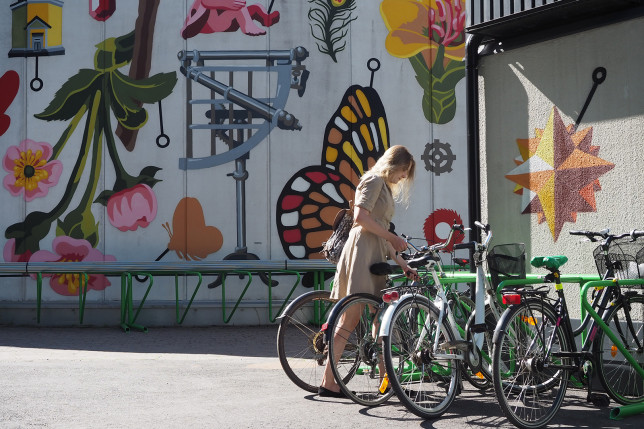CIVITAS ECCENTRIC 2016–2020
CIVITAS ECCENTRIC - Final report (in Finnish, the English version will be published soon)
Additional information: www.turku.fi/en/civitas-eccentric
All these themes were further developed in a four-year CIVITAS ECCENTRIC project funded by the EU’s Horizon 2020 programme. All the actions carried out in the project also supported the City’s strategic objectives of an attractive Turku. The project’s Living Laboratory area, where different measures were tested in practice, was the Kupittaa district.
In addition to Turku, four other cities were involved in CIVITAS ECCENTRIC: Munich, Stockholm, Madrid and Ruse. 29 other parties were also featured.
- Thanks to ECCENTRIC, mobility planning has been considered with the same importance as traffic planning. The Mobility as a Service concept, MaaS, was also developed further here in Turku and has since influenced many planning processes, says the City’s urban planning director Mr. Timo Hintsanen.
Year-round cycling
The most visible accomplishment of the project was the Föli-fillarit (Föli Bikes), a bicycle-sharing system which is the first year-round city bike system in Finland. The bike system was integrated into the public transport service. The bikes were greeted with great joy however, the user amounts have not risen to the expected level. The users have been relatively happy with the bikes, though, as the bikes got a grade of 3,9 on a scale of 1-5.
The Föli-fillarit bike-sharing system was established in a modern way which enables different ticket integrations e.g. the possibility to rent a bike with a Föli season ticket. The bikes have increased the visibility of year-round cycling in the City and due to this Föli-fillarit was awarded as one of the best Cycling Actions in Finland in 2018.
What started as a pilot during the project has since become an established service for cyclists in Turku: the 12 kilometers long winter cycling route is planned to be expanded to cover a route as lengthy as 80 kilometers in 2025. The route is maintained by sweep salting, in which any snow on the road is removed by sweeping and the slipperiness of the road is reduced with a sprayable brine.
Different kinds of traffic control pilots were also conducted in the project. Passage through was blocked in parts of Kupittaanpuisto park. This increased the safety of the area considerably, as motor traffic ceased in front of the Kupittaa Sports Hall and discussions are going on whether the arrangement will be established permanently.
How did Turku profit from ECCENTRIC?
CIVITAS ECCENTRIC brought to attention the need of wider regional co-operation regarding the development of traffic and mobility. It also clearly showed that a city the size of Turku can be a notable mover and shaker when it comes to affecting matters on the EU-level. A great example of this is the Mobility as a Service readiness level indicator which was developed in Turku.
- Changing the mobility behaviour is a long process which evokes various feelings. The project showed that with systematic communications and stakeholder co-operation the public discussion can be encouraged, new perspectives can be found, and even wider change processes can be executed. International co-operation speeds up the development and opens new possibilities, says project manager Ms Stella Aaltonen.
According to Timo Hintsanen, the project has shifted the angle of mobility planning from solving issues related to private cars to widening the range of mobility options, at the same time creating a cozier and healthier city.
- We also learned that, in the future, a holistic mobility related project such as ECCENTRIC is important to station to corporate level and that the City’s civil servants and external experts need to be involved in an early stage to gain the best results that take all the different aspects into account, says Stella Aaltonen.
- In a project where new concepts are piloted, expertise on service design as well as business development and involvement efforts performed in cooperation with businesses are important.
The project had a direct or indirect impact on several documents lining traffic or mobility plans, such as the National Growth Programme for the Transport Sector, the Turku region Land use Housing and Transportation agreement and the Southwest Finland transport system plan update. In addition, the City’s cycling development programme, parking policies and the Turku master plan 2029 can be influenced by data produced in ECCENTRIC. Partly inspired by the measures taken by Turku or other cities of the project consortium, several other projects were launched.




